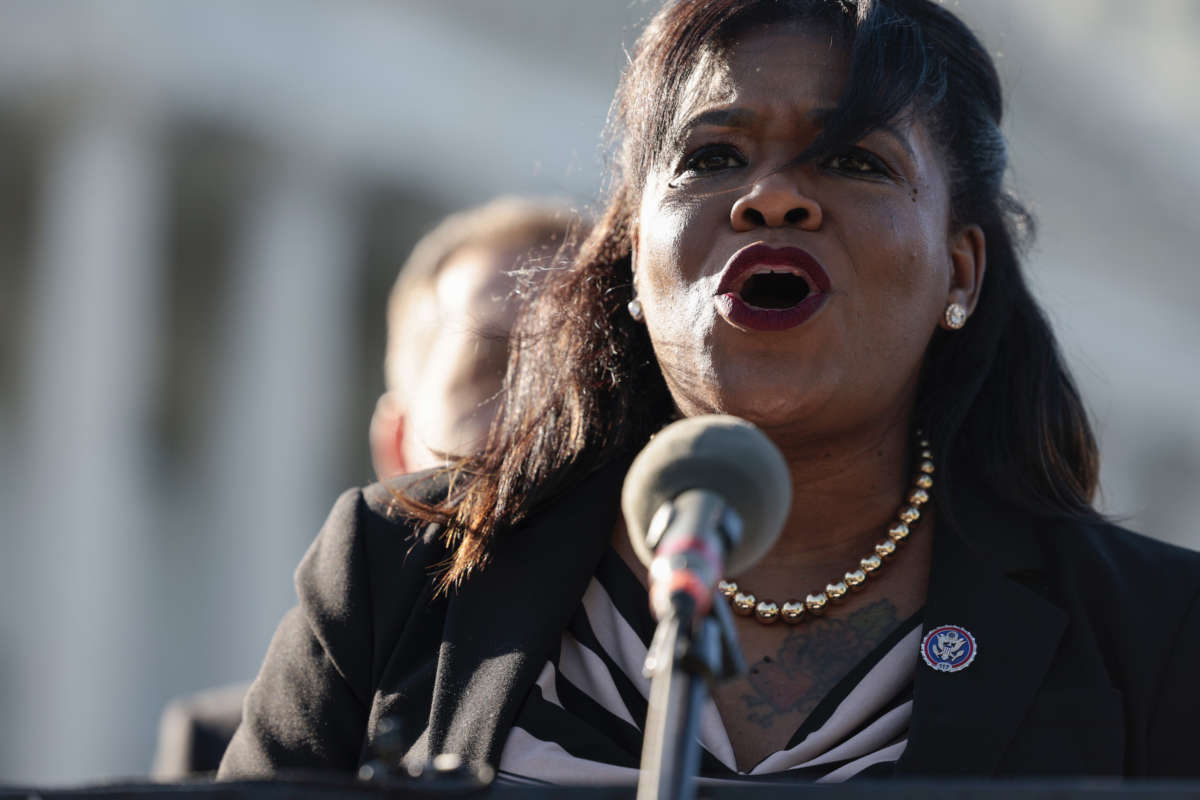Support justice-driven, accurate and transparent news — make a quick donation to Truthout today!
On Tuesday night, Rep. Cori Bush (D-Missouri) shared a heart-wrenching story of her experience with gun violence in an abusive relationship, after the Senate passed a bipartisan gun bill that would place larger restrictions on the ability of convicted domestic abusers to obtain guns.
“I was ~20 years old when I found myself in a relationship with an abusive partner,” Bush wrote at the beginning of a thread on Twitter. “I knew that he had guns. He kept one of them in the cabinet in the kitchen and another in between our pillows when we slept at night. I never believed he would actually fire at me. Until he did.”
Bush continued, saying that her abuser became upset with her one day while she was cooking, and started hitting her. As she ran away, she wondered why he wasn’t chasing her until she heard gunshots, she said.
“I did not know that they were aimed at me until they started whizzing past my head,” she wrote. “That moment. The horror of that moment stays with me. The moment when gun violence strikes is deeply traumatic and completely preventable.”
The Missouri progressive concluded by praising senators for passing a bill that would close the so-called boyfriend loophole, which allows domestic abusers to buy a gun as long as they never lived with, were married to, or had a child with the person they abused.
“Closing the boyfriend loophole could have saved me from a lethal environment,” she said. “As a survivor, I’m glad to see this provision included in the Bipartisan Safer Communities Act. Closing the boyfriend loophole will save lives.”
If passed into law, the bill will expand the definition of a domestic abuser to include people found guilty of domestic abuse who fall outside of those parameters, though it will still allow people convicted of abuse-related misdemeanors to buy a gun after five years, as long as they haven’t been convicted of any other violent crimes.
Advocates against domestic violence have been working for years to close the boyfriend loophole, which disproportionately enables gun violence against women. Hundreds of women are murdered by their former or current partners each year, and 7 in 10 women who are killed by their partners were previously abused by that partner.
The Senate bill, which passed 64 to 34 on Tuesday night, now goes to the House, where lawmakers are expected to pass it swiftly. The bill contains provisions that would ultimately limit the number of guns owned by the public, including expansions of background checks and restrictions on sales to people under 21.
While measures like closing the boyfriend loophole have been celebrated, gun control advocates and progressive lawmakers have criticized the legislation for taking steps to increase criminalization through a provision meant to reduce gun trafficking, which opponents say would enhance the criminal legal system and put the enforcement mechanism into the hands of untrustworthy police departments.
“If we’re talking about just using this as an excuse to dramatically increase an enforcement mechanism that we know is not capable, right now, of preventing mass shootings, then I’m not really interested in doing something for show for the American public,” Rep. Alexandria Ocasio-Cortez (D-New York) said last week when an outline of the bill first came out.
Advocates have also taken issue with several provisions in the bill that they say distract from the actual root causes of gun violence, including misogyny, far right ideologies and the multibillion dollar gun industry and their deep-pocketed lobbyists. Instead, they say, the bill helps to pin the U.S.’s gun violence epidemic on issues like mental health or the amount of doors in schools.
Media that fights fascism
Truthout is funded almost entirely by readers — that’s why we can speak truth to power and cut against the mainstream narrative. But independent journalists at Truthout face mounting political repression under Trump.
We rely on your support to survive McCarthyist censorship. Please make a tax-deductible one-time or monthly donation.
